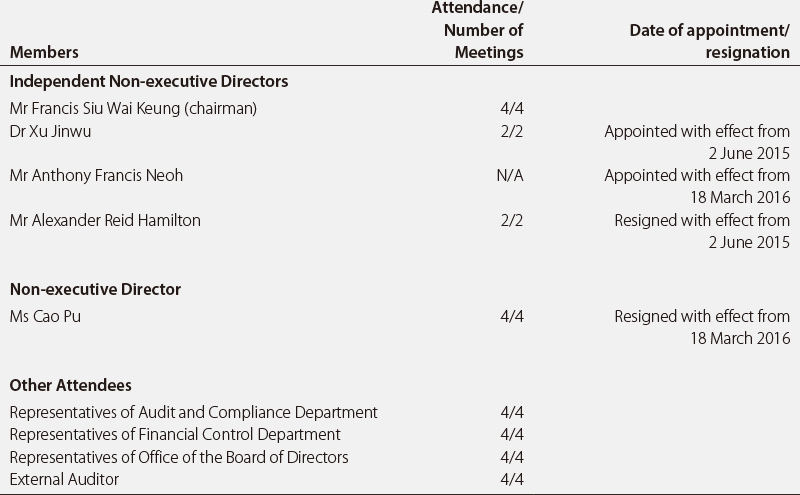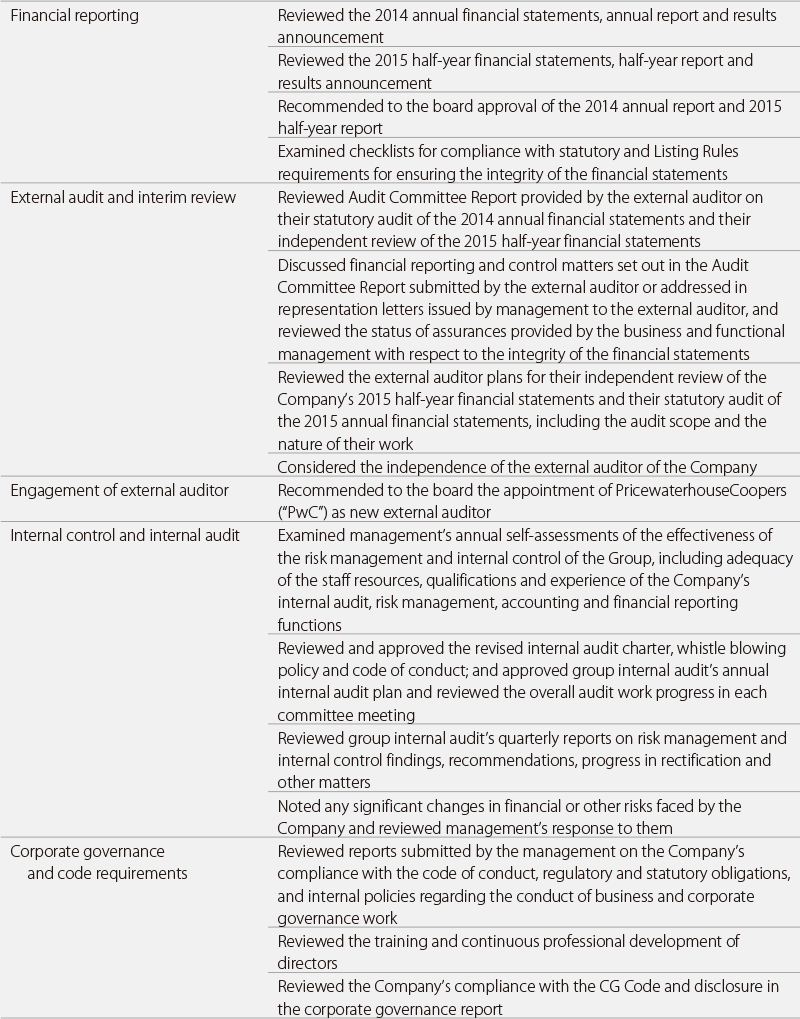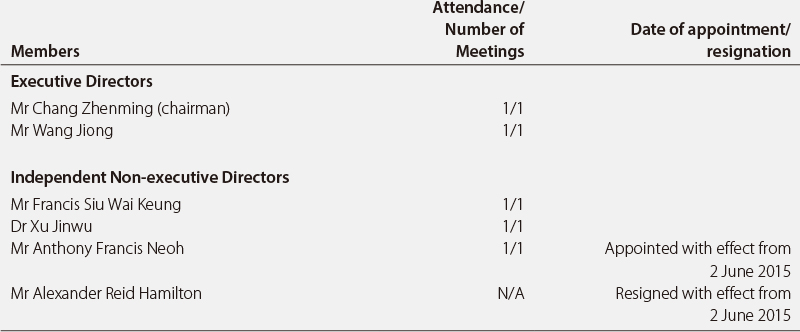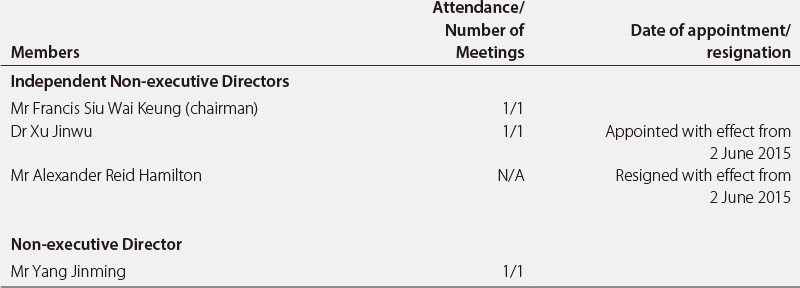Board Committees
The board has appointed a number of committees to discharge the board functions. Sufficient resources are provided to enable the board committees to undertake their specific roles. The respective role, responsibilities and activities of each board committee are set out below:
Executive committee
The board has established an executive committee to assist the board in the business operations and management of the Company. The principal role of the executive committee is to select suitable candidates for senior management, to review/provide advice to the board on material investment plans and feasibility studies and proposed disposals/ divestments, mergers, acquisitions and other significant transactions of the Company, strategy and planning of the Group.
The functions and powers of the executive committee are
- to formulate the Company’s material strategic plans;
- to formulate the Company’s annual material investment and financing plans (including reviewing material investment plans, feasibility studies, proposed disposals/divestments, mergers and acquisitions and other significant transactions of the Company);
- to review the Company’s annual business plan and finance plans;
- to review monthly reports of the Company, and to submit to the board before each month-end the monthly report for the previous month;
- to manage and monitor the Company’s core activities;
- to appoint and remove mid-level and above key personnel (other than personnel above the rank of assistant president, and those appointed and removed by the board);
- to approve rules and systems on the day-to-day operations of the Company;
- to review and approve proposals to establish and adjust the Company’s management and organisational structure; and
- to discharge other powers and functions conferred on it by the board.
Items (i), (ii) and (iii) and other matters within the authority of the board should be submitted for approval by the board, and thereafter implemented by the executive committee. The asset and liability management committee is established as a sub-committee under the executive committee. During the year, authority was granted by the board to the executive committee in terms of financing.
The committee is chaired by Mr Chang Zhenming, the chairman of the board, and other members are Mr Wang Jiong (being executive director, vice chairman and president of the Company and also serves as vice chairman of the committee), Mr Zhu Xiaohuang (who serves as vice chairman of the committee), Mr Feng Guang, Ms Li Qingping (being executive director and vice president of the Company), Mr Pu Jian (being executive director and vice president of the Company) and Mr Zhu Gaoming (being vice president of the Company). The committee met eight times in 2015. Full minutes of the meetings are kept at the executive office, which are sent to the committee members after each meeting.
Audit and risk management committee
The audit and risk management committee oversees the relationship with the external auditor, and to review the Company’s financial reporting, annual audit and interim report. The committee acts on behalf of the board in providing oversight of the Company’s financial reporting system, risk management and internal control systems, reviews and monitors the effectiveness of the internal audit function, and reviews the Company’s policies and practices on corporate governance. The committee currently consists of three independent non-executive directors, Mr Francis Siu Wai Keung (who serves as the chairman of the committee), Dr Xu Jinwu and Mr Anthony Francis Neoh (appointed on 18 March 2016). Mr Francis Siu Wai Keung has the relevant professional qualification and expertise in financial reporting matters. The audit and risk management committee holds at least four regular meetings each year (at least two of which are with the Company’s external auditor). At invitation of the audit and risk management committee, other directors, senior management and other relevant persons, as well as experts or consultants with relevant experience or expertise may also attend the meetings. The audit and risk management committee members also meet in separate private sessions with the external and internal auditors without the presence of executive directors and management at least once a year.
Duties of the audit and risk management committee
The authority, role and responsibilities of the audit and risk management committee are set out in written terms of reference. The committee reviews its terms of reference at least once a year to ensure they remain in line with the requirements of the CG Code. Amendments to the terms of reference are submitted to the board for approval. The full terms of reference are available on the Company’s website and the Stock Exchange’s website.
Under its terms of reference, the audit and risk management committee shall
- review and monitor the integrity of the Company’s financial information and provide oversight of the financial reporting system;
- monitor the effectiveness of external audit and oversee the appointment, remuneration and terms of engagement of the Company’s external auditor, as well as its independence;
- oversee the Company’s internal audit, risk management and internal control systems, including the resources for the Company’s internal audit, risk management, accounting and financial reporting functions, staff qualifications and experience, as well as arrangements for concerns raised by staff on financial reporting, internal control and other matters (“whistle-blowing”);
- undertake corporate governance functions delegated from the board, including
- reviewing the Company’s policies and practices on corporate governance and making recommendations to the board as well as the Company’s compliance with the CG Code and disclosure in the corporate governance report;
- reviewing and monitoring
- the training and continuous professional development of directors and senior management;
- the Company’s policies and practices on compliance with legal and regulatory requirements;
- the code of conduct and compliance manual (if any) applicable to employees and directors; and
- the Company’s whistle-blowing policy and system.
- undertake other authorities delegated by the board.
Committee composition and meeting attendance
The composition of the audit and risk management committee during the year as well as the meeting attendance of the committee members are as follows:
Membership and Attendance
The joint company secretary, Mr Choy Wing Kay, Ricky acts as the secretary to the committee. The committee is supported by a working group which consists of representatives from Audit and Compliance Department, Financial Control Department, Office of the Board of Directors and other departments of the Company. The working group provides services to the committee to ensure that sufficient resources are made available for the committee to perform its duties. An agenda and committee papers are sent to the committee members at least three days prior to each regular meeting. The draft and final version of minutes are circulated to all committee members for their comments and records within a reasonable time after the meeting. Full minutes of the meetings are kept at the company secretariat office.
The chairman of the committee summarises the activities of the committee and issues arising and reports to the board after each audit and risk management committee meeting.
Work done in 2015
The audit and risk management committee performed the following in 2015:
In the meeting held on 21 March 2016, the audit and risk management committee reviewed and approved the Company’s annual financial statements and annual report for the year ended 31 December 2015, and considered reports from the external and internal auditors. The audit and risk management committee recommended that the board approves the 2015 annual report.
Nomination committee
The nomination committee was established by the board with written terms of reference in compliance with the CG Code. The full terms of reference are available on the Company’s website and the Stock Exchange’s website.
The nomination committee reports directly to the board and its primary functions are
- to determine the policy for the nomination of directors and set out the nomination procedures and the process and criteria adopted to select and recommend candidates for directorship, which shall take into consideration the principle of diversity;
- to review the structure, size, composition and diversity of the board at least annually and make recommendations on any proposed changes to the board;
- to assess the independence of independent non-executive directors;
- to make recommendations to the board on the appointment or re-appointment of directors; and
- to review the board diversity policy and make recommendations on any required changes to the board.
The board diversity policy sets out the approach to achieving diversity on the board, which includes and makes good use of the difference in skills, experience and background, geographical and industry experience, ethnicity, gender, knowledge and length of service and other qualities of the members of the board. These differences will be considered in determining the optimum composition of the board and all board appointments will be based on merit, having due regard to the overall effective function of the board as a whole. The Company believes that diversity can strengthen the performance of the board, promote effective decision-making and better corporate governance and monitoring. The nomination committee discusses and agrees annually the relevant measurable objectives that the board has set for implementing this policy and makes recommendations to the board for approval. It also monitors the implementation of this policy and reports to the board on the achievement of the measurable objectives for achieving diversity under this policy.
The nomination committee comprises two executive directors and three independent non-executive directors, and is chaired by the chairman of the board. The committee meets at least annually and at such other times as it shall require. The joint company secretary, Mr Choy Wing Kay, Ricky acts as the secretary to the committee. The committee is provided with sufficient resources enabling it to perform its duties, and it can seek independent professional advice at the Company’s expense if necessary.
During the year, one nomination committee meeting was held and three sets of written resolutions were passed by all the committee members. The joint company secretary prepared full minutes of the nomination committee meeting and the draft minutes were sent to all committee members within a reasonable time after the meeting.
The composition of the nomination committee during the year as well as the meeting attendance of the committee members are as follows:
Membership and Attendance
Work done in 2015
The nomination committee completed the following work in 2015:
- reviewed the structure, size, composition and diversity of the board;
- reviewed the board diversity policy and discussed the measurable objectives;
- recommended the appointment of two executive directors, a non-executive director and an independent none-xecutive director to the board for approval; and
- made recommendations to the board on the re-election of directors retiring at the 2015 EGM and 2015 AGM respectively.
In March 2016, the nomination committee by means of written resolutions resolved to recommend to the board (1) the appointment of two non-executive directors and an independent non-executive director and (2) the re-election of directors at the 2016 AGM.
Remuneration committee
The principal role of the remuneration committee is to determine and review the remuneration packages of individual executive directors and senior management, including salaries, bonuses, benefits in kind, share options and other plans. The remuneration committee reviews and approves the management’s remuneration proposals with reference to the board’s corporate goals and objectives, salaries paid by comparable companies, regulations promulgated by national regulatory authorities on the remuneration of directors and senior management, time commitment and responsibilities and employment conditions elsewhere at the Group, so as to align management incentives with shareholder interests.
The committee currently comprises two independent non-executive directors and a non-executive director. The chairman of the committee is Mr Francis Siu Wai Keung, an independent non-executive director. The committee meets at least once a year. The joint company secretary, Mr Tang Zhenyi serves as the secretary of the committee. The full terms of reference are available on the Company’s website and the Stock Exchange’s website.
During the year, one remuneration committee meeting was held and two sets of written resolutions were passed by all the committee members. The joint company secretary prepared full minutes of the remuneration committee meeting and the draft minutes were sent to all committee members within a reasonable time after the meeting.
The composition of the remuneration committee during the year as well as the meeting attendance of the committee members are as follows:
Membership and Attendance
Work done in 2015
The remuneration committee completed the following work in 2015:
- recommended to the board (i) the increase in directors’ fees for non-executive directors (including independent non-executive directors); and (ii) additional remuneration for non-executive directors serving on the audit and risk management committee;
- reviewed and approved the 2015 remuneration plan for the senior management (including executive directors) of the Company in May 2015; and
- reviewed and approved the 2014 pay level for the senior management (including executive directors) of the Company in December 2015.
Details of the Company’s remuneration policies are set out in the Environmental, Social and Governance Report and directors’ remuneration and retirement benefits are disclosed here. Share options granted under the CITIC Pacific Share Incentive Plan 2000 which ended on 30 May 2010 are disclosed here.
The remuneration paid to the directors, by name, for the year ended 31 December 2015 is set out in note 12 to the consolidated financial statements.
The remuneration of senior management, by band, for the year ended 31 December 2015 is set out below.
Remuneration of senior management other than directors for the full year 2015
- Note:
- (1) Although the discretionary bonuses have yet to be confirmed by the relevant regulatory authority, it is expected that the unsealed remuneration will have no material impact on the financial statements of the Company for 2015.
- (2) The data set out above have been converted from RMB based on the average exchange rate for 2015 (HKD1=RMB0.80294).
Special committee to deal with matters relating to investigations of the Company
A special committee has been established to deal with all matters relating to all investigations (including enquiries) of, and proceedings involving, the Company and its directors, arising from the 2008 forex incident, including but not limited to by the Market Misconduct Tribunal (“MMT”), the Securities and Futures Commission and the Commercial Crime Bureau of the Hong Kong Police Force (the “Investigation”). The Special Committee is authorised by the board and empowered to
- approve communications between the Company and any relevant authorities or third parties in relation to the Investigation;
- consider the issue of legal professional privilege and to make decisions on behalf of the Company in connection therewith; and
- seek legal and professional advice on behalf of the Company as well as approve their fees.
The committee currently comprises two members, namely, Mr Zhang Jijing and Mr Francis Siu Wai Keung. No physical committee meetings were held during the year, and the committee members dealt with certain administrative matters concerning the MMT proceedings and the protection of legal professional privilege by way of circulation.
In respect of the appeal against the Court of First Instance’s judgment dated 19 December 2011, the Court of Appeal has on 29 June 2015 handed down a judgment on the first part of the appeal in the Company’s favour with costs. The remaining part of the appeal was adjourned in order to give the Department of Justice and the Police time to inspect the documents subject to the appeal (on a limited waiver and a completely confidential basis) to consider if they would continue to oppose the Company’s appeal. That inspection process was completed in September 2015. Subsequently, the Police/Department of Justice have agreed not to contest the remainder of the Appeal, subject to the parties’ agreement on the directions for the disposal of the Appeal. The parties have been negotiating the further directions and orders to be sought from the Court for the purpose of the disposal of the remainder of the appeal.
In respect of the proceedings brought by the Hong Kong Securities and Futures Commission at the MMT against the Company and five of its former executive directors (further particulars of which are set out in note 46 to the Notes to the consolidated financial statements), the hearing was part heard in November and December 2015. It is expected that the hearing will resume in April 2016.
Other management committee
The Company has established the Asset and Liability Management Committee (“ALCO”) as a sub-committee under the executive committee to be in charge of monitoring and controlling the financial risks of the Company. The principal responsibilities of the ALCO are to
- monitor and control the asset and liability financial position of the Company on a regular basis;
- monitor and control the following issues of the Company:
– asset and liability structure
– counterparties
– currencies
– interest rates
– commodities
– commitments and contingent liabilities - review financing plans of the Company and manage the cash flow of the Company on the basis of the annual budget; and
- establish hedging policies and approve the use of new financial instruments for hedging.
Mr Zhang Jijing, an executive director of the Company until 23 December 2015, was the chairman of the ALCO and chaired 9 meetings in 2015. Mr Zhu Gaoming (being vice president of the Company and a member of the executive committee) became the chairman of the ALCO on 24 December 2015. Other members include responsible persons of the Financial Control Department, Treasury Department, Strategic Development Department and the Office of the Board of Directors. Full minutes of the meetings are kept by the ALCO Secretariat Office and sent to the committee members after each meeting.







